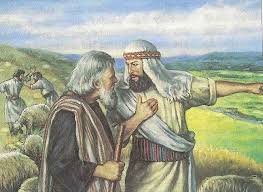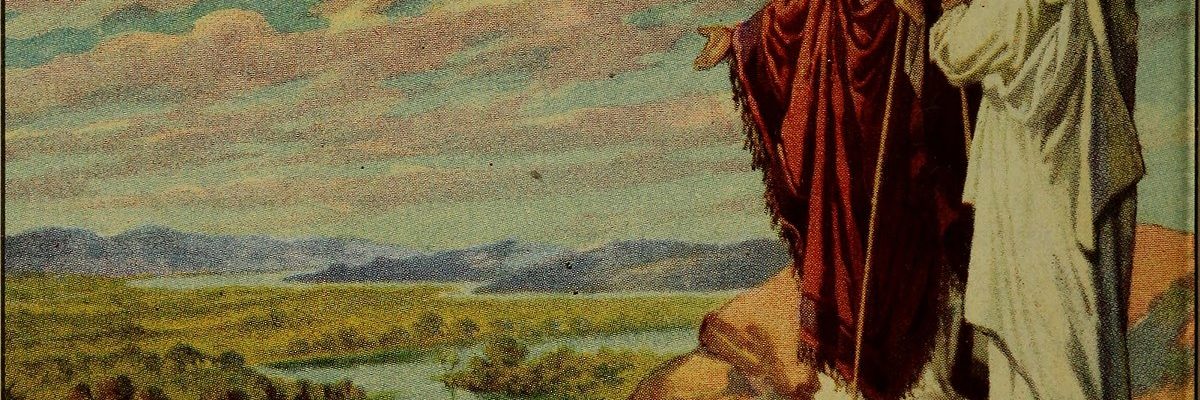Abraham encountered God, saw His glory, and was instructed by the Lord to leave his country, extended family, and relatives. Unfortunately, Lot never had an encounter with God or received any instruction from Him about this inheritance. Abraham took him along into the inheritance that God had promised him. In the New Covenant, your inheritance is God, and then the vision or ministry He has committed into your hands.

Some dangers of such an alliance for Abraham were that he experienced lack, delay, and temporarily lost some ground, which should have been a blessing for him.
An uncircumcised man lifts his eyes, gleaning for opportunities in the world. Unaware of the pitfalls therein, he falls and never rises again. A circumcised heart lifts his heart to the Lord to receive God’s instruction on how to walk in the world, engage with it, and possess it for Him.
Jesus never formed an alliance with anyone. The Bible says He did not commit Himself or His vision to any man, for He knew all men (Jn 2:24-25). Also, before He appointed the twelve disciples from among all His followers, He prayed all night to God, and at daybreak, He chose them (Luke 6:12-13). He chose them to be with Him, not for partnership first, but so they could learn of His life and ways. Then He made them fishers of men (coworkers/co-heirs) (Mk 3:14-15).
Fellowship with Jesus makes His disciples co-owners with Him; we are co-heirs together with Him and shall reign with Him.
Temporary Loss to Abraham’s Inheritance
Lot, on the journey to Abraham’s vision, was not willing to learn and follow the God who called him. He was only following and seeking opportunities—how he could benefit from God’s inheritance meant for Abraham.
A Lot in the journey to your vision is not willing to learn and follow the God who called you.
Scripture reveals that when Abraham and Lot were to part ways, Abraham proposed that if Lot chose the east, he would go west, and vice versa. It’s important to note that the plain of Jordan, chosen by Lot, was part of the land God promised to Abraham (Gen 10.19; Deut 34.3-4). This negotiation resulted in a temporary loss of part of Abraham’s inheritance.

Nonetheless, the Lord showed mercy to Abraham for not being bitter against Lot. Because of Abraham’s faithful heart and to lift his spirits—since he had lost a “supposed adopted son” and the prosperous plain of Jordan to feed his cattle—God told him to lift his eyes after Lot left. God then showed him a greater scope of his possession, which also included the portion Lot chose (eastward).
Despite Lot occupying the plain of Jordan, God promised to give it to Abraham (Gen 13.17). God commanded him to arise and walk through the length and breadth of the promised land—north, west, east, and south. Thus, God was finding a way to take Lot out of Abraham’s inheritance.
We see a greater scope and receive grace for mobilization through God when Lot leaves our company.
Handling Alliances
Abraham was not equally yoked with the people of Canaan. He never mingled with them, except to maintain a frugal relationship, as we saw when he was rescuing his nephew. He formed a temporary confederacy with some of them to rescue his nephew and allowed them to take their reward (Gen 14.13; Gen 14:23). He never owed them anything and was never intimate with them.
A man walking in God’s divine purpose will always define clearly any association.
Lot, on the other hand, formed economic, political, and marital alliances (his daughters) with the people of the land, who were exceedingly wicked and sinful in God’s sight.
Imagine if Lot had chosen the west, then Abraham would have chosen the east (toward the plain of Jordan). Abraham would not have formed an alliance with the people in those cities of the plain.
Threatened Portion
The Promised Land was not an optional portion for Abraham to possess but a commandment. It was not a matter of Abraham’s interest but God’s. It was not just for Abraham but for his generations, even to Jesus Christ. It contains the city of the great King.
When you don’t take seriously the portion God has given you, parasites will infest it (Lot and the Perizzite).
Take cautiously God’s portion in your hands and seek understanding of it, lest parasites infest it.
Lot was a parasite in Abraham’s portion, and he gained access because he was in alliance with Abraham. The famine in Abraham’s portion that led to his downward journey could probably be traced to Lot and his servants (Gen 12.5), because God did not include their provision in Abraham’s journey. They consumed the divine provision meant for Abraham, his wife, and his servants.
When Abraham first arrived in the Promised Land, the Canaanites were already there as parasites. When Abraham returned from Egypt, the Perizzites had joined the Canaanites, occupying other parts of the land (Gen 13:7).
When you don’t occupy the portion God has for your life, parasites will invade it.
Costly Assumption
It would have been a costly assumption for Abraham to think that Lot and his servants had learned God’s ways of discipleship from him and would fill the eastern part of the inheritance with God’s life and faith. Lot and his servants were not seeking the manifestation of the kingdom of God but were self-seeking and opportunistic, though they appeared as brethren to the true followers of Jesus. Although the Bible refers to Lot as righteous, he was still struggling with worldly lust.
God’s instruction to Abraham in Genesis 13:14-17 can be seen as saying, “Abraham, don’t assume you have a spiritual brother possessing and raising disciples for Me in the eastern part of the land I gave you. You are still responsible for everything. Arise now, walk through it, and it will be yours” (Gen 13:14-18). “Wherever the sole of your foot shall tread, it shall be given to you as a possession” (Deut11.24).
Abraham likely believed that Lot had filled the land with righteous people, as evidenced by his intercession for the cities of the plain when God planned to destroy Sodom and Gomorrah (Gen 18.22-33). However, there were not even ten righteous people in the cities, and they were destroyed. Abraham realised that Lot had not multiplied or filled the land with disciples, and Lot’s servants had followed the ways of the world.
Destroyed Portion
If Abraham had lived in the cities of the plain, which were part of the Promised Land, God might not have destroyed these cities. Abraham, Sarah, and their servants were more than fifty, thus these cities could have been preserved. As noted earlier, Abraham might not have mingled with the people there, but for their sakes, the cities could have been spared (Gen 18.19).
May I not be absent from my duty place when the Master calls for watchmen.
The Power of God at Work Through Abraham
When the four kings (Amraphel, Arioch, Chedorlaomer, and Tidal) raided and defeated the five cities of the plain (Gen 14.1), God showed His Almightiness through Abraham. He gave the five kings and the people of the land into Abraham’s hands, demonstrating His power. Abraham displayed God’s might to the king of Sodom, the other kings, and the people, showing that he was in control of the land (Gen 14.10-24).
Regaining the Lord’s Portion
Nothing unclean or uncircumcised can inherit God’s portion. God removed Lot from Abraham’s assigned portion because Lot was unfruitful and did not bring forth the fruit of God’s kingdom. Lot was assigned to another location—the mountain—to be alone with God, but he still chose part of the holy land, Zoar. God’s plan for Lot was to come into the cleft of the rock (Jesus), be sanctified, and receive his own portion in Him. Zoar became the boundary preserved for Abraham’s descendants to possess (Deut 34.3-4).
Abraham lived by faith. He obeyed God and moved from his land of nativity to the Promised Land. He dwelt there by faith, in a strange country, living in tents with his family and grandchildren. While in the land of promise, unlike Lot, Abraham never sought an earthly city, riches, or opportunities. Instead, he looked for a city built by God with an enduring foundation. He and his wife confessed they were strangers and pilgrims on earth because they desired a better country (heavenly), and God was not ashamed to be called their God, for He had prepared for them a city (Heb11.13-16).
Indeed, Abraham obeyed God’s instruction on how to possess the land—“walk through it as a stranger and pilgrim, not as a citizen.” For “we have no continuing city, but we seek one to come” (Heb13.14).
How do you see this world, which the Lord has given you to fill with the holy seed? As a disciple, are you raising others to fill the land with disciples of Jesus Christ? Do you seek and run after opportunities, or do you wait on the Lord to receive instructions on how to carry out this assignment?








